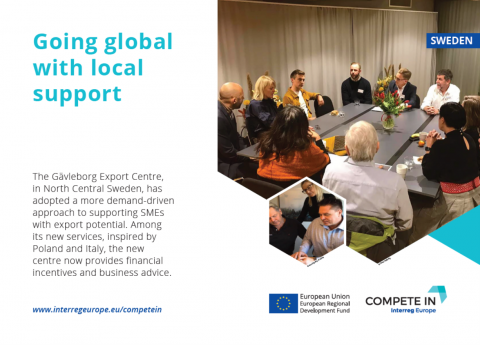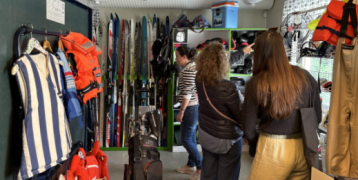The Swedish Presidency of the EU and interregional cooperation

On 1 January 2023, Sweden has taken over the EU Presidency from the Czech Republic for the upcoming six months. The priorities of the Swedish Presidency 2023 are:
- Security – unity
- Competitiveness
- Green & energy transition
- Democratic values and the rule of law – our foundation
These priorities reflect positions that Sweden has traditionally advocated in the EU and respond to the current challenges facing the European Union.
We asked Maria Eriksson from the Ministry of Rural Affairs and Infrastructure, Interreg Europe's point of contact in the country, a few questions about the role and benefits of interregional cooperation linked to the Presidency.
What are the benefits of EU membership for Sweden?
I think that our EU membership has contributed to the vitalisation of regional development work in Sweden. Thanks to the cooperation in the EU, we have introduced new approaches and working methods.
Most societal challenges require cooperation and common solutions and that is why Cohesion policy as well as Interreg programmes are such important tools for regional development.
And what the benefits of interregional cooperation?
Interregional cooperation fosters culture of openness and builds trust across borders which is important to the prosperity of our societies. Mutual sharing of ideas and finding solutions to common challenges is the cornerstone of Interreg. Interreg Europe has linked European regions up with each other and contributed to learning and exchange of knowledge between actors on local, regional and national levels.
Through interregional cooperation, Swedish organisations can strengthen their competences and become more competitive in an increasingly globalised world. Interregional cooperation allows to share ideas, see other perspectives and get insights that go far beyond what one can achieve on his/her own.
More information about the Swedish involvement in Interreg Europe
Sweden joined the European Union in 1995. With its population of over 10 million, it is one of its smaller members. Yet the involvement of Swedish partners in the interregional cooperation projects is quite high:
- 56 of the 258 Interreg Europe projects approved in 2014-2020 have 63 Swedish partner organisations; five projects have a Swedish lead partner
- 16 of the 72 Interreg Europe projects approved under conditions in 2021-2027 have 20 Swedish partner organisations; three projects have a Swedish lead partner
Swedish project partners are improving policies
Thanks to interregional cooperation and policy learning, 27 policy changes and improvements have already taken place in Sweden. Nine changes are linked to the Structural Funds programmes. The Swedish project partners mobilised close to MEUR 6.2 of funding for implementation of the changes, MEUR 3.7 of it from the Structural Funds.

For example, the COMPETE IN project looked for new ways to support their SMEs with export potential. Thanks to the exchange of experience, the Gävleborg Export Centre provides new financial incentives and business advice.
You can find out more about all project results at this page.
Good practices from Sweden
There are 81 Swedish good practices in our good practice database. See a few recent examples, also in the carousel below:
- Web-based platform for social enterprises was developed in Örebro County in times of the corona pandemic to support the local social enterprises
- Gävle Innovation Arena has been developed as part of the Future Position X cluster and Digital Innovation Hub to initiate projects, create relationships and build collaborations between business, academia and the public sector
- Reuse center for building material at the Municipality of Lessebo created a market place for individuals and enterprises to leave their building materials at the reuse stations and for customers to buy the materials
Discover more about Swedish participation in Interreg Europe
- Browse through all projects with Swedish partners and learn about further examples of fruitful interregional cooperation
- Get inspired by good practices from Sweden
- Find out more country-specific information at the Swedish country page










